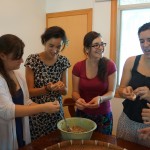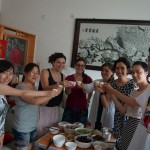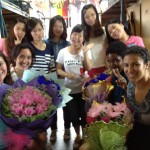“Yi, er, san, qiezi!” “One, two, three, eggplant!” That was probably one of the phrases I heard and used the most in our last week in Jishou. It is the Chinese equivalent of “say cheese!” when taking a picture. I love to repeat Chinese phrases I hear while walking on the street, regardless of whether or not I know the meaning. It’s probably not the best idea, but after I saw every Chinese tourist in Fenghuan during our homestay use this phrase, I caught on to it. The students also all seemed to be thoroughly amused when I say it.
One thing I’ve learned about Chinese people, is that every moment is a Kodak moment. That was no exception in our last week – Halloween, Talent Show, and Graduation. But this rule hasn’t really been an exception for us either, between Nick’s iPhone videos and photos and the collective thousands of photos taken by the own members of our group.
This last week has been a week of contrasts.
Contrasting emotions. Joy and happiness for successfully completing the summer, establishing beautiful friendships, and all of the joy that the students always bring to our lives. Sadness and nostalgia as we looked back at the summer and realize we will soon be leaving Jishou and perhaps never seeing many of the students again.
Contrasting scenes. The twenty-four hour train ride from Jishou to Shanghai was full of realizations. Twenty-four hours on a train did not feel like a long time, as it did at the beginning of the summer. Unlike the first time I was absolutely disgusted to use the squat toilet on the train, it now seemed quite clean compared to what I’ve encountered on this trip. The vendors and carts on the train no longer amused us as much as they first did. The beds on the train felt hard in contrast to the wooden plank I slept on in Jishou. I was used to China and everything that seemed strange at first.
And then arriving to Shanghai was a complete culture shock. It looked nothing like the China I was used to. What were all these Westerners doing here? Why isn’t everyone staring and pointing at our group like we’re aliens? What are all these modern buildings and Western foods? Why is the food not spicy? Shanghai literally felt like being in a different country.
And that’s when the assimilation to Western culture began. Now it’s my second day at home and, to be honest, I’ve never experienced culture shock like this. Thankfully we did have those two days in Shanghai to welcome us back into Western culture; I can’t imagine coming here straight from Jishou. For instance, yesterday my brother took me shopping with him…I asked him if he can bargain the price for his jeans. Turns out that’s not an option at the Aventura Mall. But as I unpack my bags, upload my pictures from this summer, and slowly adjust to being back in America, I can’t help but smile when thinking of the happy days spent in Jishou.







You must be logged in to post a comment.